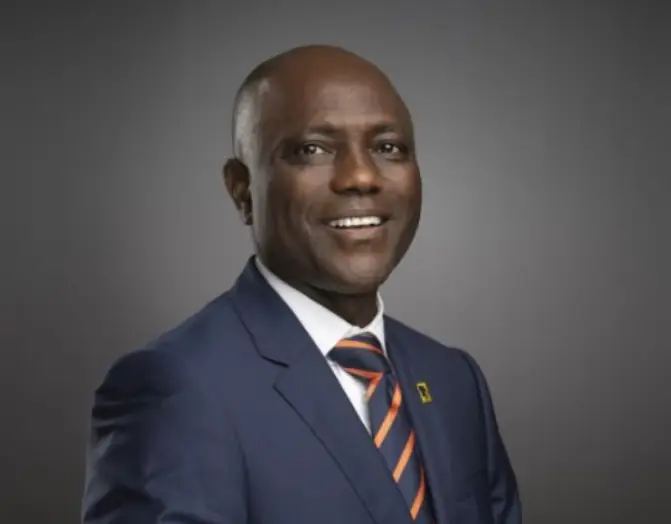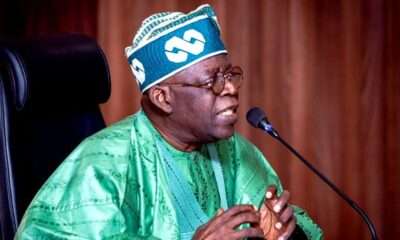Business
Nigerians Buy One Million Air Conditioners Annually, Says UN
Published
1 year agoon
By
Editor
Nigeria must not be dumping ground, FG Warns
Nigeria must not be a dumping ground for air conditioners and refrigerators with energy efficiency ratio that are below internationally acceptable minimum energy performance standard, the Federal Government declared on Thursday.
This came as the United Nations says Nigerians purchase about one million air conditioners every year.
Meanwhile, the Federal Government told the Nigeria Customs Service, Standard Organisation of Nigeria, and other relevant agencies, to be alive to their responsibilities, stressing that the influx of substandard cooling appliances posed danger to the climatic conditions across the country.
This came as the United Nations Environment Programme announced that over one million air conditioners were sold annually in Nigeria, adding that this was eating deep into the finances of Nigerians with respect to energy bills.
READ ALSO: How I Lost N500m To Non-smoking Nightclub Business — Comedian AY
Speaking at the National Stakeholders’ Consultative Workshop on Energy Efficient and Climate-Friendly Cooling in Nigeria, the Minister of Science, Technology and Innovation, Adeleke Momara, said the enforcement of laws should be intensified.
After listening to a presentation by the UNEP Programme Management Officer, Brian Holuj, on the magnitude of pollution caused by the influx of substandard cooling devices imported into Nigeria, Mamora charged the NCS and SON to be alive to their duties.
“I listened to your presentation and certain issues were raised in it. There is the issue of monitoring and enforcement of protocols. Often times, we have beautiful policies and laws, but it is not the beauty of the policy, guideline or law that matters. It is the zeal for implementation that is most important.
“You mentioned this issue of Minimum Energy Performance Standard. What I think is that you have a minimum standard, but if there is no compliance with that, then we cannot get results. And if we must get results, it means the enforcement agencies must be alive to their responsibilities.
“The customs, Standard Organisation of Nigeria, and other relevant agencies need to be alive to their responsibilities and ensure that Nigeria does not become a dumping ground, where you just bring in all sorts of products that are not in line with what we expect by way of standards,” the minister stated.
READ ALSO: Our Diaspora Supporters Have Right To Peaceful Protest — LP
He said the workshop, which was organised by the Energy Commission of Nigeria and UNEP, was aimed at promoting energy efficiency best practices in the cooling sector in Nigeria.
Momara said UNEP officials flew into Nigeria to support the country’s transition from inefficient cooling appliances to the most efficient ones in line with Nigeria’s commitment to mitigating climate change challenges.
He said, “It is a fact that Nigeria is the largest market in Africa, and this also applies to the cooling sector. With the current growing population, combined with improving lifestyle, urbanisation and rising global warming, Nigeria will continue to experience growing demand for air conditioners, refrigerators and other cooling devices.
“Thus becoming one of the fastest growing air conditioners and refrigerators market in the world. Unfortunately, most of the air conditioners utilised in the country have an energy efficiency ratio below internationally acceptable minimum energy performance standard.”
You may like


FG Targets 2.5m Jobs Through LEEP


FG Revokes 924 Dormant Mining Licences


FG Sets Up Committee To Oversee Cancer Health Fund


Presidency Unveils Platform For Citizens’ Feedback


BREAKING: FG Extends Public Holiday For Eid-El-Fitr Celebration


BREAKING: FG Declares Public Holiday For Eid-el-Fitr Celebration

The Central Bank of Nigeria (CBN) started fresh and direct sales of US dollars at N1,021 per dollar to Bureau De Change operators.
Nigeria’s apex bank disclosed this in a circular signed by its Director of Trade and Exchange Department Hassan Mahmud.
“We write to inform you of the sale of $10,000 by the Central Bank of Nigeria (CBN) to BDCs at the rate of N1,021/$1. The BDCs are in turn to sell to eligible end users at a spread of NOT MORE THAN 1.5 percent above the purchase price,” the circular posted on its website read.
READ ALSO: Tinubu Unveils African Counter-Terrorism Summit
“ALL eligible BDCs are therefore directed to commence payment of the Naira deposit to the underlisted CBN Naira Deposit Account Numbers from today, Monday, April 22, 2024, and submit confirmation of payment, with other necessary documentations, for disbursement of FX at the respective CBN Branches.”
CBN’s move is coming as the naira is recording a slight depreciation against the dollar after weeks of gains.
In late March, the bank also sold $10,000 to each of the eligible Bureau De Change (BDC) operators in the country at the rate of N1,251/$1.
READ ALSO: Mixed Reactions Trail Video Of Couple’s Customised N200 Notes
Like in the most recent sales, it warned BDCs against breaching terms of the dollar sales, vowing to sanction defaulters “including outright suspension from further participation in the sale”.
The fortunes of the naira have fallen sharply since President Bola Tinubu took over in May. Inflation figures have reached new highs and the cost of living hitting the rooftops.
Nigeria’s currency slid to about N1,900/$ some months ago at the parallel market. But in recent weeks, it has gained against the dollar.
The Nigerian authorities have also doubled down on their crackdown against cryptocurrency platform Binance and illegal BDCs.
On March 1, the CBN revoked the licences of 4,173 BDCs over compliance failures.

Olusegun Alebiosu has been appointed as the Acting Managing Director/Chief Executive Officer of First Bank of Nigeria Limited (FirstBank Group), effective April 2024.
Alebiosu steps into this pivotal role from his previous position as the Executive Director, Chief Risk Officer, and Executive Compliance Officer, a position he held since January 2022.
Alebiosu brings to the helm of FirstBank over 28 years of extensive experience in the banking and financial services industry. His expertise spans various domains including credit risk management, financial planning and control, corporate and commercial banking, agriculture financing, oil and gas, transportation, and project financing.
READ ALSO: JUST IN: Access Holdings Names New Acting CEO
Having embarked on his professional journey in 1991 with Oceanic Bank Plc. (now EcoBank Plc.), Alebiosu has held several notable positions in esteemed financial institutions.
Prior to joining FirstBank in 2016, he served as Chief Risk Officer at Coronation Merchant Bank Limited, Chief Credit Risk Officer at the African Development Bank Group, and Group Head of Credit Policy & Deputy Chief Credit Risk Officer at United Bank for Africa Plc.
Alebiosu’s academic credentials further enrich his professional profile. He is an alumnus of the Harvard School of Government and holds a Bachelor’s degree in Industrial Relations and Personnel Management. Additionally, he obtained a Master’s degree in International Law and Diplomacy from the University of Lagos, as well as a Master’s degree in Development Studies from the London School of Economics and Political Science.
READ ALSO: Meet Newly Appointed Union Bank CEO
A distinguished member of various professional bodies, including the Institute of Chartered Accountants (FCA), Nigeria Institute of Management (ANIM), and Chartered Institute of Bankers of Nigeria (CIBN), Alebiosu is renowned for his commitment to excellence and ethical practices in the banking sector.
Beyond his professional endeavors, Alebiosu is known for his passion for golf and adventure. He is happily married and a proud parent.
With Alebiosu’s appointment, FirstBank of Nigeria Limited anticipates continued growth and innovation under his leadership, reinforcing its position as a leading financial institution in Nigeria and beyond.
Business
CBN Gives New Directive On Lending In Real Estate
Published
1 week agoon
April 17, 2024By
Editor
The Central Bank of Nigeria, CBN, has released a new regulatory directive to enhance lending to the real sector of the Nigerian economy.
The directive, issued on April 17, 2024, with reference number BSD/DIR/PUB/LAB/017/005 and signed by the Acting Director of Banking Supervision, Adetona Adedeji, signifies a notable shift in the bank’s policy towards a more contractionary approach.
In line with the new measures, the CBN has reduced the loan-to-deposit ratio by 15 percentage points, down to 50 per cent.
This move aligns with the CBN’s current monetary tightening policies and reflects the increase in the Cash Reserve ratio rate for banks.
READ ALSO: JUST IN: CBN Gov Sacks Eight Directors, 32 Others
The LDR is a metric used to evaluate a bank’s liquidity by comparing its total loans to its total deposits over the same period, expressed as a percentage.
An excessively high ratio may indicate insufficient liquidity to meet unexpected fund requirements.
All Deposit Money Banks are now mandated to adhere to this revised LDR.
The CBN has stated that average daily figures will be utilised to gauge compliance with this directive.
Furthermore, while DMBs are encouraged to maintain robust risk management practices in their lending activities, the CBN has committed to continuous monitoring of adherence and will adjust the LDR as necessary based on market developments.
READ ALSO: JUST IN: CBN Increases Interest Rate To 24.75%
Adedeji has called on all banks to acknowledge these modifications and adjust their operations accordingly. He emphasised that this regulatory adjustment is anticipated to significantly influence the banking sector and the wider Nigerian economy.
The circular read in part, “Following a shift in the Bank’s policy stance towards a more contractionary approach, it is crucial to revise the loan-to-deposit ratio policy to conform with the CBN’s ongoing monetary tightening.
“Consequently, the CBN has decided to decrease the LDR by 15 percentage points to 50 per cent, proportionate to the rise in the CRR rate for banks.
“All DMBs must maintain this level, and it is advised that average daily figures will still be applied for compliance assessment.
“While DMBs are urged to sustain strong risk management practices concerning their lending operations, the CBN will persist in monitoring compliance, reviewing market developments, and making necessary adjustments to the LDR. Please be guided accordingly.”

Three Suspected Pipeline Vandals Caught In Edo
Cultists Arrested For Invading Anambra Hotel With Charms

LASTMA, Viju Officials Clash Leaves 10 Injured
Trending

 Entertainment4 days ago
Entertainment4 days agoBridesmaids’ Dance At Wedding Causes Stir On Social Media [VIDEO/PHOTOS]

 Metro4 days ago
Metro4 days agoVIDEO: ‘UNN Lecturer’ Caught Pants Down With Married Student

 News2 days ago
News2 days agoDrama! Supporters Of Yahaya Bello Perform Rituals to Prevent His Arrest By EFCC [Video]

 Headline3 days ago
Headline3 days agoDrama As Women Fight Dirty, Breasts Fall Out During Spring Break Outing In US [PHOTOS/VIDEO]

 News3 days ago
News3 days agoVIDEO: Force PRO Orders Arrest Officers Caught On Video Bashing Driver’s Car

 Entertainment3 days ago
Entertainment3 days agoNollywood Actor, Zulu Adigwe Is Dead

 Headline3 days ago
Headline3 days agoMeet 17-year-old Nigerian Who Won $3.5m Worth Of Scholarships From Harvard, 13 Other Foreign Universities

 Metro2 days ago
Metro2 days agoEdo Cultists Kill Rival In Daughter’s Presence, Abandon Getaway Car

 News4 days ago
News4 days agoIGP, Jonathan Disagree Over State Police

 Headline3 days ago
Headline3 days agoVideo Of Girl Being Bullied, Slapped At Lead British School Sparks Outrage Online [PHOTOS/VIDEO]




























